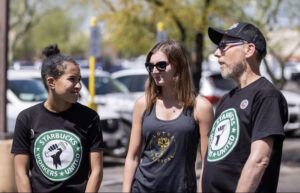On February 3, 2023, a Norfolk Southern freight train derailed in East Palestine, Ohio. It’s an environmental catastrophe that illustrates how workers’ rights, corporate exploitation and ecosystems are closely intertwined.
Twenty cars on the 150-car train that derailed were carrying hazardous materials, including vinyl chloride, a highly-flammable carcinogen used in plastics manufacturing.
Norfolk Southern executed a “controlled release” (controlled burn) of the chemicals to prevent an even bigger explosion. The fires burned for several days.
Officials ordered a mass evacuation of residents, affecting 5,000 people. They’ve been told it’s safe to return. But many remain alarmed, expressing concerns about the air quality and water pollution. Inhaling vinyl chloride can be deadly and has unknown long-term health impacts.
Residents say they’ve experienced trouble breathing, headaches and nausea, and that pets, livestock and local wildlife are turning up sick or dead. Some locals say they’re leaving for good.
The leaked chemicals also entered the Ohio River Basin, which supplies water for 5 million people.
How could we have let this happen?
Union rail workers have warned of this “ticking time bomb” for years.
In a statement from Railroad Workers United, workers explained that the major U.S. railroads have consistently cut safety measures to pursue profit in recent years. They wrote, “in the last 10 years, Class I carriers have dramatically increased both the length and tonnage of the average train while cutting back maintenance and inspection.”
And it’s not just Norfolk Southern, which owns the train that derailed in East Palestine. Railroads have been trying to run these complex operations with fewer workers and less stringent regulations. They’ve cut 22% of jobs since 2017 and have pushed for one-person train crews, across the board.
When rail workers were on the verge of striking last fall, they expressed major concerns that the railroads’ new system of running the lines, “Precision Scheduled Railroading,” was all about profit-maximization — at the expense of worker and public safety.
Rail workers are overburdened and exhausted, operating trains with no days off and no sick leave. That’s a huge danger for them.
The rail companies know this. And it’s not like they don’t have the money to fix it. Rail companies are making record profits.
Norfolk Southern brought in over $12 billion in revenue in 2022. They also announced a new $10 billion stock buyback program last year. (This means the company spent $10 billion to buy back their own stock and inflate the price in order to line the pockets of their rich investors — rather than spending the money on improving safety or working conditions.)
Rail companies are also using their money and power to lobby against regulations.
Before this latest disaster, Norfolk Southern lobbyists helped kill a federal rule requiring rail cars carrying toxic flammable materials to have modern electronic braking systems to stop trains more quickly.
Corporations routinely try to dismantle regulations that protect environmental systems, sacrificing communities and ecosystems to pursue profit.
Norfolk Southern, which had been warned about a disaster like this for years and still refused to implement safety measures or give workers adequate time off, first offered to cut the town a check for $25,000. That’s $5 per person. Norfolk Southern is worth $55 billion. We know they can do more.
What’s the takeaway?
When a train derails, and we see images of balls of fire in the sky over Ohio, it’s not just a freak accident. It’s a systemic problem with lucrative railroad companies putting profit over people and planet again and again.



